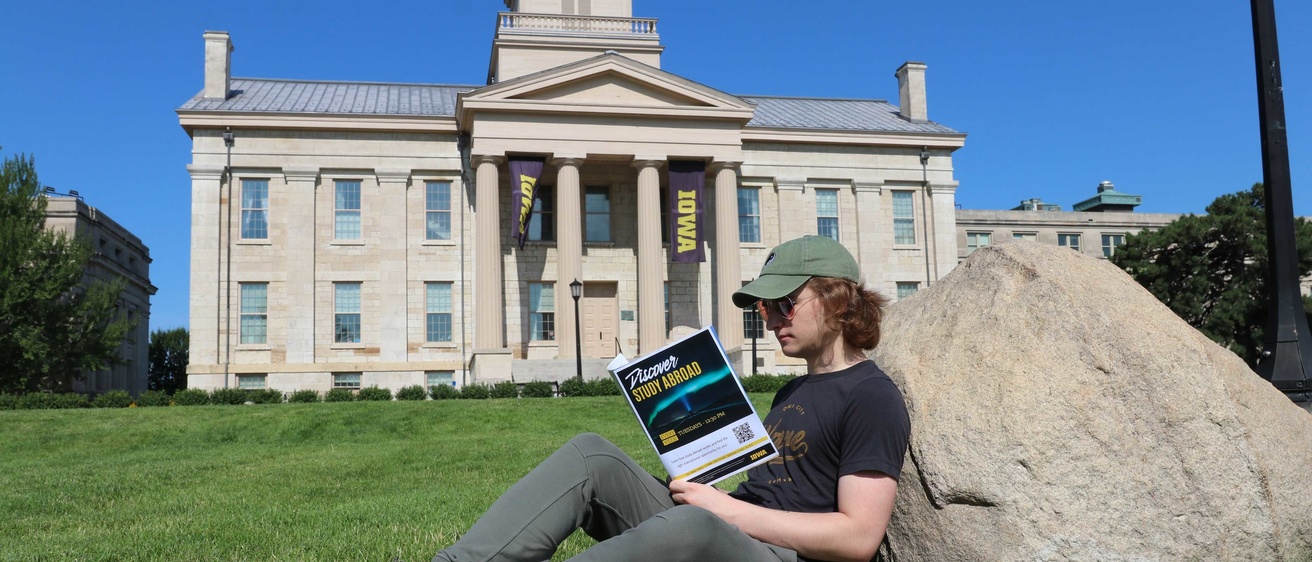As a student who is going to study abroad next year, take it from me, the summer is a great time to cross off a few items on your to-do list. In addition to going through the process myself, I’ve also been lucky to have the unique perspective of working in International Programs (IP) at the University of Iowa. So, if you’re interested in studying abroad, here are my top five recommendations to help you get started.
1. Complete a Discover Study Abroad session
The first step to your study abroad process is to finish the required Discover Study Abroad (DSA) session—either through Zoom (live sessions offered weekly) or through ICON (can be completed at your own convenience). It’s there to help answer some of the most-asked questions by students starting the process. After completing the session, all you need to do is call Study Abroad at (319) 335-0353 to get assigned to a study abroad advisor based on your major.
2. Explore scholarships & grants
On average, especially if you're paying in-state tuition, a semester spent studying abroad could cost more than living on campus. Thankfully, there are many opportunities to help lessen the cost of studying abroad through financial aid, grants, and scholarships. An enriching experience like studying abroad shouldn’t be exclusive to those who can easily afford it. Did you know that last year over $500,000 was awarded to UI students for studying abroad?
3. Narrow down your programs
Another way to start planning for study abroad is by checking out the study abroad program search page . This is a super useful tool that shows you every study abroad program that is sponsored by the UI. These programs include a variety of subjects and take place on nearly every continent. You can narrow down your search based on many different parameters (where you want to go, length of program, time of year, etc.) to help you find the program that’s just right for you. The program pages themselves offer information about pricing, credit hours, activities to do while you’re abroad, and all other kinds of useful facts. This is one of the best, and most fun ways to get started with studying abroad.
4. Talk with your family
Arguably the most important aspect of starting the study abroad process is being on the same page as your parents/guardians or other adults in your life. Keeping open communication with your support network will help you plan for things like where you’ll go, what you’ll study, and how you’ll pay for your semester abroad.
5. Get a passport
Did you know you can apply for a passport right here at the University of Iowa? You’ll definitely need a passport to study abroad, and the U.S. Department of State can have some long processing times for getting your passport. So why not call the UI passport office at (319) 353-2700 and secure an appointment today? In most cases, your passport will be valid for the rest of your college career and beyond (10 years!).
Final thoughts
Leaving the country and exploring a new place can be a scary thing, but without risk there is no reward. I will finish up this article with a fitting Game of Thrones quote from Oberyn Martell, played by national treasure Pedro Pascal: “Tis a big and beautiful world. Most of us live and die in the same corner where we were born and never get to see any of it. I don’t want to be most of us.”
International Programs (IP) at the University of Iowa (UI) is committed to enriching the global experience of UI students, faculty, staff, and the general public by leading efforts to promote internationally oriented teaching, research, creative work, and community engagement. IP provides support for international students and scholars, administers scholarships and assistance for students who study, intern, or do research abroad, and provides funding opportunities and grant-writing assistance for faculty engaged in international research. IP shares their stories through various media, and by hosting multiple public engagement activities each year.
